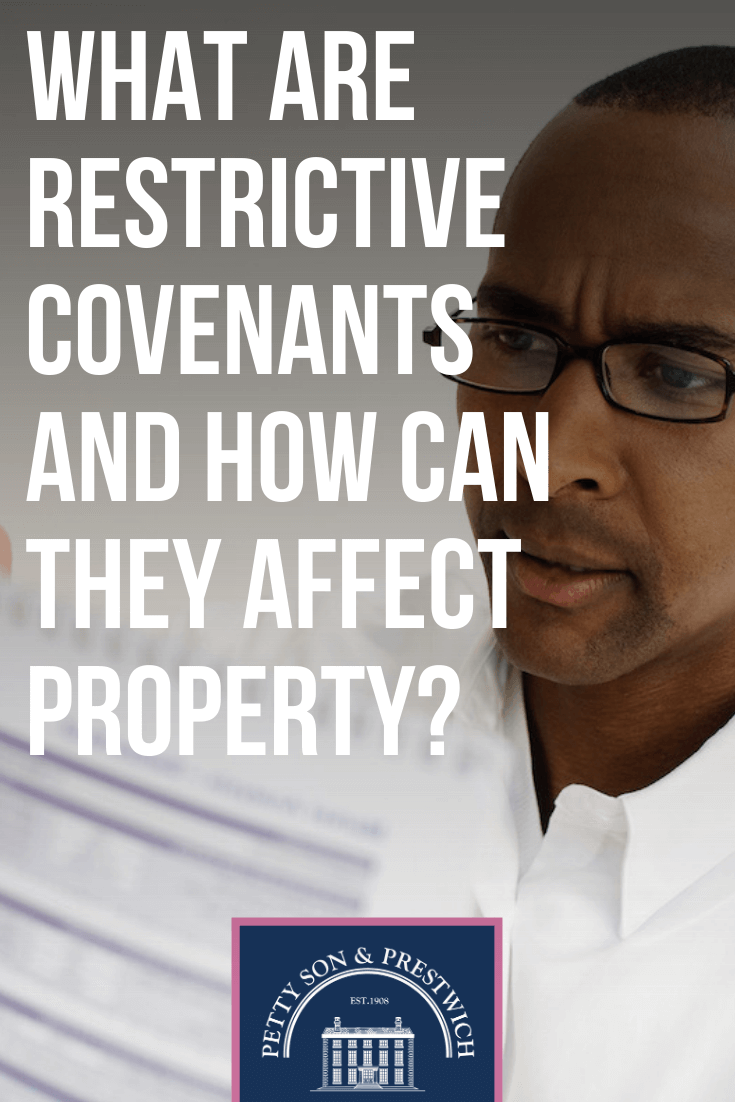In some instances, owning your home doesn’t automatically mean you can do as you please with it. Restrictive covenants can be put in place by sellers to prevent buyers from altering certain aspects of the property or the land upon which it sits.
In today’s post, we’re going to take a deep dive into restrictive covenants, exploring exactly what they mean and what you can potentially do about them.
What are restrictive covenants?

Essentially, restrictive covenants are clauses put in place by the seller to ensure certain standards are upheld. They are most commonly used in relation to residential property, but their scope can be broad.
Restrictive covenants are frequently put in place for the benefit of others, with the most routine example being that of a neighbouring property. This could be to protect the value of the property or simply to maintain a desirable state of homogeneity.
An important point to remember is that restrictive covenants ‘run with the land’, which means the conditions set by the seller are passed on to all future owners, not just the person who made the initial purchase. Therefore, subsequent sales will still be affected and covered by the restrictive covenant.
Restrictive covenant examples
As mentioned above, the scope of restrictive covenants can be surprisingly broad. However, there are a few standard examples homeowners may come across:
- Restrictions on building further structures
- Restrictions on access over land
- Restrictions on trading from the property
- Restrictions on changing the internal structure
- Restrictions on alterations without consent
Can leaseholders be subjected to restrictive covenants?
Yes. Restrictive covenants can indeed be placed into leases. These are actually quite widespread, but they are often more straightforward than those found on freehold properties.
Some examples of restrictive covenants in leases include:
- Not being allowed to keep pets
- Not being allowed to sublet the property
- Not being allowed to remove or alter internal walls
- Not to willfully cause nuisance to other residents
- Restrictions over parking
- Running a business from the flat / apartment
- Changing the flooring
How do I find out what restrictive covenants are on my property?

The first thing to be aware of here is that there may not be any restrictive covenants on your property. While restrictive covenants are often used by sellers, it is not automatically assumed that all properties will have one (or more) in place.
If you are looking into restrictive covenants retrospectively (i.e. you already own the property), your first port of call should be the Land Charges Register of the title document. Naturally, this will only apply to registered land, as the Land Registry will not, understandably, have any information on land that remains unregistered.
Going through this document will enable you to find out if there are any restrictive covenants imposed upon your property. In most instances, restrictive covenants will be highlighted and explained, but not always. Consult with your solicitor if there are shades of grey that need clarifying.
What happens if my solicitor missed a restrictive covenant?
It’s important to note that your solicitor should have made you aware of any restrictive covenants that may be in place during the conveyancing process; it’s their responsibility to do so.
Should you inadvertently breach a restrictive covenant or simply find one that you were unaware of, you would certainly be within your rights to complain to the Legal Ombudsman if your conveyancer failed to point it out to you.
Be aware, though, that the Legal Ombudsman can only award compensation up to £50,000, which may fall short of the costs you incur, depending on the type of restrictive covenant that has been breached.
What can I do if I think the restrictive covenants are unreasonable?
Should you believe that a restrictive covenant found on your property is unreasonable, you may be able to get them changed or removed altogether. This can involve quite a process, so you need to be prepared for a lengthy fight.
Your first option is the most simple, but its effectiveness will vary from case to case: contact the party with the benefit of covenant, explain your situation, and negotiate. Your goal here is to gain what is called retrospective consent. Some will be willing to listen, while others may not be.
Applying to the Upper Tribunal of the Lands Chamber is a common course of action and is especially useful if you consider the restrictive covenant to be either obsolete or unreasonable. County courts can be called upon if the restrictive covenant is considered unenforceable.
Another option is to take out insurance against enforcement of restrictive covenants. As one would expect, this will vary greatly from situation to situation, but many find this course of action satisfactory and its usage is surprisingly common.
Whichever avenue you decide to take, legal advice should be sought and adhered to.
What happens if I fail to comply with a restrictive covenant?
Breaching a restrictive covenant could result in a hefty bill, so the best advice is to be aware of any that are in place and heed them.
Legal action against those who breach restrictive covenants is not uncommon, but you may find the landowner will ask you to rectify the situation first. This could mean returning the property to its original state (at your expense) or possibly paying them compensation.
What about selling property where a restrictive covenant has been breached?
Obtaining legal advice over your particular case should be sought out as soon as you possibly can. Restrictive covenants are notoriously complex, so trying to deal with them yourself would be foolhardy.
A solicitor will be able to assess whether the restrictive covenant is actually enforceable and present the best options to you before you move forward.
The most common response here is to obtain restrictive covenant indemnity insurance, but this isn’t always the case, as these policies can only be granted after 12 months of the breach happening and if no complaints have been lodged in that time. Unsurprisingly, the cost of such policies can vary dramatically.
If you are looking to buy, sell, rent, or let property in East London or West Essex, we can help. Petty Son and Prestwich have been operating locally for well over a century, and we’d love to help you next.
Give us a call or pop in and see us to discuss your next move!
